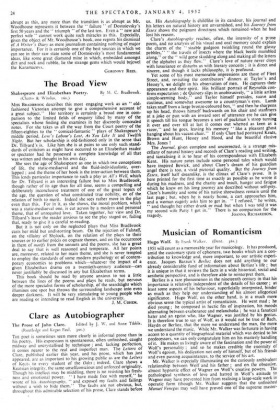Clare as Autobiographer
The Prose of John Clare. Edited by J. W. and Anne Tibble.
(Routledge and Kegan Paul. 3os.)
THE poet is sometimes seen more clearly in informal prose than in his poetry. His expression is spontaneous, often unfinished, caught midway and uncrystallised by technique • and, lacking perfection, it comes nearer to the real and imperfect man. The Letters of Clare, published earlier this year, and his prose, which has just appeared, are as important to his growing public as are the Letters of Kei.ti to every student of the Odes ; indeed, Clare shows a Keatsian integrity, the same unselfconscious and unforced originality. Though his intellect may be middling, there is no resisting his fresh- ness and emotional power. " I have made free with myself," he ••wrote of his Autobiography, " and exposed my faults and failings without a wish to bide them." The faults are not obvious, but, throughout this admirable selection of his prose, Clare stands before us. His Autobiography is childlike in its candour, his journal and his letters on natural history are unvarnished, and his Journey from Essex shows the poignant directness which remained- when he had lost his reason.
Clare's Autobiography reaches, often, the intensity of a prose poem, and no analysis of his visual and oral memory could explain the charm of the sizable gudgeon twinkling round the glossy pebbles," " the travels of insects where the black beetle mumbled along," or the " wild geese skudding along and making all the letters of the alphabet as they flew." Clare's love of nature never cloys with luxuriance or disturbs us with literary conceits ; it is direct and sincere, and though it lacks philosophy, it is profound.
Yet some of his most memorable impressions are those of Fleet Street, arid, revisiting the contributors' dinners at Taylor's and Hessey's, we delight in his observation of men. He captures their appearance and their spirit. His brilliant portrait of Reynolds con- firms expectation ; • de Quincey.slips in unobtrusively, " a little artless simple-seeming body," and Taylor himself presides, suave and cautious, and somewhat awesome to a countryman's eyes. Lamb takes snuff from a large bronze-coloured box, " and then he sharpens up his head, throws himself backwards on his chair and stanimers at a joke or pun with an inward sort of utterance ere he can give it speech till his tongue becomes a sort of packman's strop turning it over and over till at last it comes out whetted as keen as a razor," and he goes, leaving his memory " like a pleasant ghost hanging about his vacant chair." If only Clare had portrayed Keats, Brown and Hunt, Hessey and Hood, and the beautiful elusive Mrs. Jones !
The Journal, given complete and uncorrected, is a strange mis- cellany of natural history and records of Clare's reading and writing, and tantalising it is to hear of his correspondence with Elizabeth Kent. His nature notes include some personal tales which would have inspired Bewick, and about Clare's dream of his guardian angel there is too, a vivid pictorial quality. But the Journey from Essex, itself half dreamlike, is the climax of Clare's prose. It is here printed for the first time as exactly as possible as he wrote it during his madness, and the charity and insult, hunger and fatigue which he knew on his long journey are described without self-pity. Clare's humility and some of his native shrewdness remain until the last page ; but, when he is nearly home, a cart approaches him, and a woman eagerly asks him to get in. " I refu.sed," he writes, " and thought her either drunk or mad but when I was told it was my second wife Patty I got in." There is no comparison for the






































 Previous page
Previous page